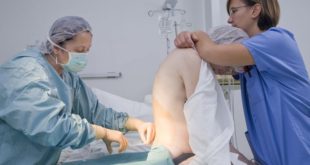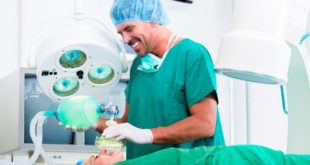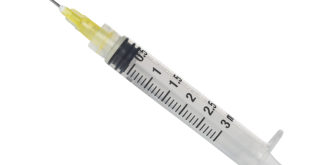Experiencing awareness under anesthesia is a topic that frightens many patients when preparing to undergo general anesthesia.
This serious, but rare, complication received even more attention with the release of the movie Awake (released in 2007). Unfortunately, this movie did a horrible job of portraying this sensitive but important topic (If you’d like me to write a post dissecting the inaccuracies in this film, mention it in the comments section below).
Here are 12 things that your anesthesiologist would like you to know regarding “awareness”:
1. It is extremely rare for a patient to become conscious during surgery and subsequently remember what occurred in the operating room. According to the ASA (American Society of Anesthesiologists), this happens about 1-2 times per 1000 general anesthetics.
2. Anesthesia awareness can range from brief, fuzzy memories to very specific and detailed recollections of events/conversations/etc. that occurred during the time the surgery was performed.
Also important to remember, most instances of recall do NOT involve feeling “pain”. Still scary though.
3. If you are really scared about this, or have experienced awareness in the past, please let your anesthesiologist know. They can take the time to explain to you in detail why this is very unlikely to occur and what they are going to do to monitor and (hopefully) prevent it.
4. Please also understand what is NOT awareness:
You may have some recall of events BEFORE the induction of general anesthesia. This can include the ride into the operating room, the placing of monitors, and breathing of oxygen by facemask. You may also have some recollection of the “waking up” part at the end of your procedure and the ride out of the operating room and into the recovery area.
Also understand that some procedures are done under some level of sedation, with or without the addition of local anesthesia or nerve blocks. Because the level of sedation can vary during the procedure, you may have some recollection of events. This is NOT anesthesia awarenes, because you were not supposed to be under a general anesthetic. Some examples of these types of cases include dental procedures, colonoscopies, etc.
Ask your anesthesiologist what your anesthesia plan will be.
5. It is possible for patients to dream during surgery and then mistake parts of the dream for awareness.
I’ve had patients wake up and tell me about some very vivid and interesting dreams. One patient woke up and told me she had spent the whole time in a dream with her husband (deceased for quite some time). She was very sad to wake up.
I’ve gotten a bit off-topic here, but you get the point.
6. There are certain surgeries and situations that are higher risk for awareness. These include emergency cesarean section, trauma surgery, and cardiac surgery.
Because anesthetics affect things like your blood pressure and heart rate, your anesthesiologist may have to purposely give you less anesthetic to safeguard your life. It’s a tough decision sometimes, but ultimately we are trying to safely get the patient through the surgery or procedure.
7. DO tell your anesthesiologist about any medical conditions you might have. Let him/her know about all medications you are taking. This includes herbal supplements. Also be up-front about any illicit drug use and about your alcohol intake.
This medical history can impact how your body will react to the anesthesia. Your anesthesiologist keeps your medical record in confidence and is simply concerned in taking care of you in the best way possible. Help them help you by being open and honest.
8. Your anesthesiologist will do several things to safely keep you under general anesthesia.
They will monitor your vital signs (blood pressure, heart rate, EKG, pulse oximetry). If you are under duress, this typically shows up on your vital signs and alerts the anesthesiologist. Many cases involve the administration of anesthesia “gases” to keep the patient asleep. The level of these gases are monitored. There are also brain function monitors that help gauge the depth of anesthesia (eg. BIS monitor). The research thus far, however, is unclear how these monitors impact the detection or prevention of awareness.
Your anesthesiologist will make the decision on exactly what monitors to use (beyond the standard monitors we always use). No monitor can completely guarantee you will not experience awareness.
9. With all the information you now know on the subject, if you feel like you have experienced anesthesia awareness let your physician(s) know immediately.
Talk to your anesthesiologist and let them know exactly what happened and what you remember. Perhaps write down or somehow record what you remember so that you can go back and be as detailed and accurate as possible.
Your physicians will be able to compare your recollections with what occurred in the operating room. They will also be able to tell you if any events occurred during your procedure that somehow altered the anesthetic plan and put you at higher risk for awareness.
10. Early counseling, and possibly speaking with a professional, is important in dealing with the stress and confusion of these events.
An experience like this could potentially lead to PTSD (post traumatic stress disorder), and it’s important that you let someone know. Seek professional help as early as possible if this experience is adversely impacting your life.
11. Your anesthesiologist is aware of this rare but very serious complication and is striving to make your experience as comfortable as possible. Don’t be afraid to ask questions. Use us as your resource.
We are your advocates in the operating room and want you to have a smooth and comfortable experience.
12. Finally, there is an anesthesia awareness registry that is sponsored by the American Society of Anesthesiologists and run by the University of Washington. Joining the registry is completely voluntary. What it will do is help anesthesiologists in the study and understanding of this phenomenon.
Reader: Not it’s your turn. Let me know what I missed in the comments section below. If you have experienced some form of awareness and would like to share with the community, we’d love to have your valuable input.
 Anesthesia Myths: Get the Facts, Lose the Fear | Your #1 Anesthesia Resource in Simple language
Anesthesia Myths: Get the Facts, Lose the Fear | Your #1 Anesthesia Resource in Simple language




